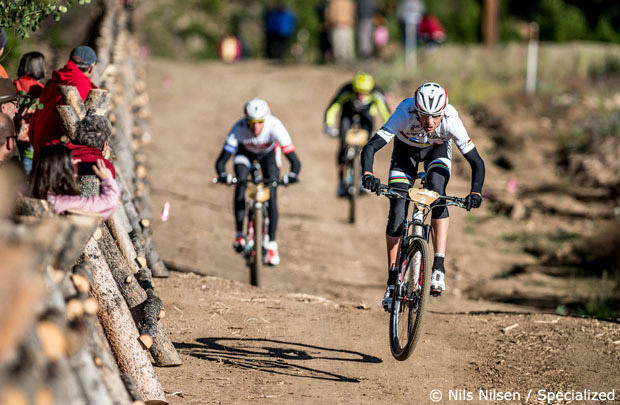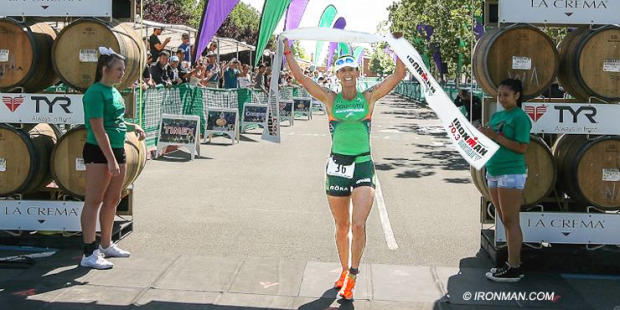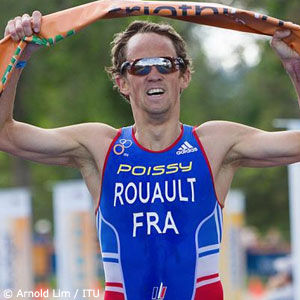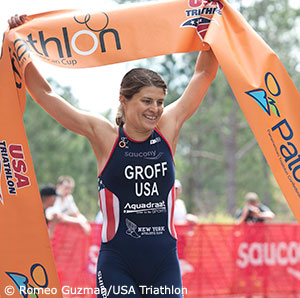Katie Hursey is a rising star
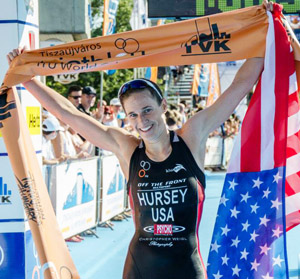
Katie Hursey started out 2013 with modest 7th place finishes at the Clermont and Sarasota ITU Pan American Cup sprint races. She then followed with a 30th place at the prestigious World Triathlon Series event in San Diego where the rookie was given a slot mainly for experience. After a disappointing 11th place at the Edmonton World Cup sprint, USA Triathlon officials started to sense the work she had done with coaches in the USA Triathlon Collegiate Recruitment Program was bearing fruit and seemed on the verge of realizing her triathlon potential indicated by her 16:10 5k running for Syracuse University and the strength she showed racing the 3000 meter steeplechase at the NCAAs.
That faith was rewarded on July 14 when Hursey won the ITU World Cup in Palamós, Spain by 47 seconds. Hursey followed that up with another win August 11 at the ITU World Cup sprint race in Tiszaujvaros, Hungary by a decisive 27-seconds margin over Olympian Aileen Reid of Ireland. Although conditions have changed and the significance of a World Cup win has fallen behind the top-drawer WTS events, Hursey still won her first World Cup far sooner than U.S. stars Barb Lindquist, Sarah Haskins and Siri Lindley.
“She is still a very young as a triathlete and her lack of experience still plays a part in some races,” says USA Triathlon Collegiate Recruitment Coordinator Barb Lindquist. “But she is a fighter for sure. She has an early swim background and ran at Syracuse. So she is strong and adapted very quickly to the bike where her aggressive, no fear mindset has helped her.” USA Triathlon Collegiate Recruitment head coach Melissa Mantak says that Hursey is exceedingly nice in everyday life but has a killer instinct in races. Perhaps most responsible for her rapid rise, says Mantak, “is an attention to detail, a quickness to understand and respond to coaching technique and strategy, and an inner drive to be the best.” USA Triathlon High Performance General Manager Andy Schmitz says: “What Katie might be able to do is a very interesting question. She has improved tremendously in a short time, but she is not close to reaching her potential.”
Slowtwitch: What did you do to celebrate your World Cup wins?
Katie Hursey: Normally I celebrate every race no matter the outcome with some ice cream. For some reason in both Palamós and Tizzy I skipped this part. Winning Tiszaujvaros it's pretty easy to celebrate with the great atmosphere after the race.
ST: With a couple weeks to look back on those wins, what did they mean to you?
Katie: Winning these races meant a lot. They show me I'm headed in the right direction and they show me I have been able to achieve goals that I hadn't even set yet for myself. Coming into this season, my goal was to compete in a World Cup by the end, not win 2 of them. It has been an incredible feeling each time I’ve stood on the podium and realized I was the reason our national anthem was playing. Such a cool feeling to represent your country at a high level!
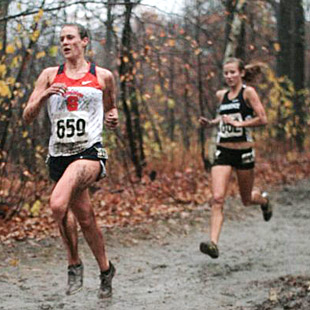
ST: Let’s go back to the beginning. Where were you born and where did you grow up?
Katie: I was born and raised in Hampstead, Maryland, a small town about 30 minutes outside of Baltimore. I actually have lived in the same house my entire life.
ST: Tell us about your parents.
Katie: My parents are Mary Lynn and Bill Hursey. Though my dad moved around a bit when he was younger, both of their families settled down in Carroll County, Maryland, the same county we still live in. My mom is a kindergarten teacher and my dad is a systems analyst for Northup Grumman.
ST: What sports did they play and how good were they?
Katie: My mom was a runner in high school and college, but had two bad knees and had to give up running. However, this year she had both her knees replaced and her new goal is to compete in the first triathlon I ever did. My dad played contact sports in high school, basketball and football. But he too turned to triathlon the last five years. They are both great at their sports and I love to watch my parents set goals for themselves and achieve them!
ST: Tell us about your siblings.
Katie: I have two sisters — Kristen is 26 and Karly is 17. (Fun fact: we all have Marie as our middle name). Kristen works in health promotion at a Maryland hospital and ran all through high school and at York College of Pennsylvania. Karly is a swimmer and is looking at colleges where she wants to compete while completing her nursing degree.
ST: What was it like growing up in the Hursey household?
Katie: I started off as quite the tyrant. I was mischievous, stubborn, and difficult until about 12. My mom always said that my hard headedness would eventually be a good thing and I guess she was right. My sisters and I partook in about every sport available. We had my mom running us between indoor and outdoor soccer, dance, indoor and outdoor lacrosse, softball, swimming, cross country and track and field. Sometimes we would be doing three different sports in one season. I have no idea how my parents juggled it all but somehow it worked out. By giving us so many different opportunities we all figured out what we liked.
ST: What qualities, values and temperaments did they pass on to you?
Katie: First and foremost they taught me to be a good person. They showed me how to work hard to achieve my goals and that failure is just a step on the way to success. My parents supported me in everything I did whether I was winning or losing and were always there to pick me up when needed. They taught me to always make sure that I love what I do and have fun with it, never taking life too seriously. They've shown me perseverance and commitment. My parents have made me everything I am today.
ST: While growing up, did you face any setbacks — and how did you deal with them?
Katie: Feel like I'm going to jinx myself here. But besides a ganglion cyst in my foot, nothing.
ST: While growing up, what sports and activities did you love?
Katie: I loved soccer and swimming first and foremost. It was fun to play a contact sport and even now I sometimes miss it. Swimming was the sport I dedicated most of my time to throughout my childhood. I enjoyed setting new goals and I love being in the water. I also dabbled in clarinet, lacrosse and collected spoons.
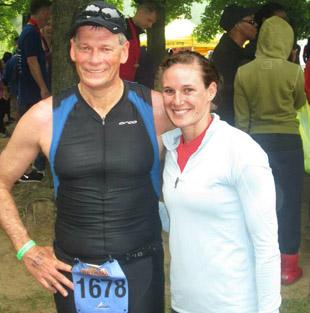
ST: As you grew up, who did you look up to?
Katie: The same people I looked up to as a little kid — my parents. To me they are the most accomplished people in the world. They are everything I strive to be as a person and as a parent in the future. There are no better role models.
ST: Did you look up to any sportsmen or sportswomen?
Katie: Most of the people I looked up to as sportsmen or sportswomen were on my teams throughout all my sports. I admired plenty of my teammates for their hard work and appreciated the fact that they were making me better each day.
ST: What subjects in school did you fancy?
Katie: In high school I interned at a physical therapy office. That was my favorite. I loved getting out of school and actually doing something directly related to what I wanted to do for a career. I enjoyed talking to the people and taking a part in their recovery.
ST: When did you become aware that you were a talented athlete?
Katie: Swimming showed me that I had some talent. At that time of my life, pretty much everything revolved around swimming and I loved it. I even loved being at swim meets for hours on end and days on days. My biggest goal was to make short course YMCA nationals. I was so excited when I made it — my mom bribed me that if I made nationals I could dye my hair. But by the time I did it, I realized if I were to dye my hair blonde it would just turn green from the chlorine. So I settled for some new swimsuits.
ST: What were your proudest accomplishments and your best times in high school sports?
Katie: My best sports in high school were cross country and outdoor track. My first year of racing I won state in the mile and the 3200. My goal was to break 5:00 in the mile but I missed by 13/100ths of a second. I finally did it my senior year when I ran 4:57. That was my proudest accomplishment, because the day before the mile I had run pretty poorly in the 3200 so I was excited that I could come back from that performance.
ST: What led you to choose Syracuse?
Katie: Coach [Chris] Fox and Coach [Brien] Bell were the reasons that I decided to go to Syracuse. I trusted them from the beginning and felt that not only did they care about me but that they were going to make me better. I was right.
ST: How many of famous Syracuse alums were you aware of?
Katie: In college I was aware of [football stars] Jim Brown and Ernie Davis, [NBA all-pro] Carmelo Anthony, Alice Sebold [author of The Lovely Bones] and [basketball coach] Jim Boeheim.
ST: What did you study at Syracuse?
Katie: I started out studying exercise science but midway through my time at Syracuse I switched to physical education. I especially enjoyed student teaching – it was so much fun to work with the kids and to see the progress they could make.
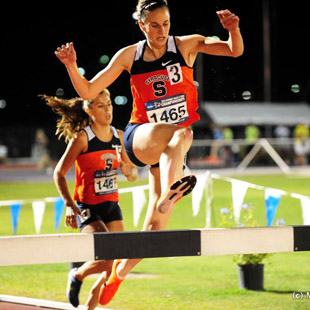
ST: What led you to the steeplechase?
Katie: My last two years at Syracuse I asked my coaches if they would let me try it. I get bored pretty easily running around in circles on the track, so I thought that jumping over barriers might add some variety. It takes strong runners to compete in steeple and that is exactly how I would describe myself.
ST: Do you know that 2011 Ironman 70.3 world champion Melissa Hauschildt was a famous steeplechaser in Australia? And that three-time Wildflower winner Jessie Thomas was a record-setting Stanford steeplechaser? Why does the steeplechase make excellent triathletes?
Katie: I didn’t know they were also steeplechasers but it doesn't surprise me at all. In steeple you have to be strong and you have to be tough, two things that are so important in triathlon. I also think steeple requires a mental toughness important in triathlon.
ST: What were your best times in cross country and track in college?
Katie: My PRs were 16:10 for 5k, 10:08 for the 3k steeple (also my greatest competitive result, it got me into the NCAA championship finals in 2011), 4:28 for the 1500, 4:47 for the mile and 9:24 in the 3k.
ST: What was your first triathlon?
Katie: My dad convinced me to compete in my first triathlon on Father's Day five years ago. It was a sprint race with a 400 meter swim in a pool, 14 mile bike and a run. I was really not in shape, but I took him up on the offer. I was coming off my two week break from running, hadn't been swimming in who knows how long, and had never biked until I rode the course a couple days before. It went well, and my dad and I won the father-daughter race. Over the next couple years I just kept doing the same triathlon once a year with him. I didn't really pursue triathlon until the fall before my fifth year at Syracuse when my coach told me I could train through the summer for triathlon since I didn't have cross country eligibility. I did a few local races that year and really enjoyed it!
ST: How has your dad encouraged you in your athletic quests?
Katie: My dad wants to see me happy and I never feel pressure for anything more. In college before every race I would get the same text message: "Run hard, have fun and tie your shoes tight." I felt really silly after a steeple race when after all his reminders the one thing I forgot to do was tie my shoes. He's my biggest fan, even though sometimes he gets so nervous for me he can't watch me race. My dad believes in me and has always been there to pick me up after the races that don't go so well and puts everything into perspective. He makes sure that I know he has full faith in me and will support me forever.
ST: You were an NCAA runner and a high school swimmer. How did you adapt and learn to bike?
Katie: I was an NCAA runner and with my background in competitive swimming and my love for the ocean, I didn't really need much adapting to the swim and run. On the other hand, I was a bit wary of the bike. I really thought I wasn't going to like cycling, but once I started I couldn't get enough of it. I loved how far you could go in a short amount of time and really enjoyed riding around central New York, which has some of the best country roads and scenery. The hardest thing was figuring out how to clip and unclip my pedals. Everyone told me you only fall once, but I was falling on a daily basis. My palms are pretty happy that I figured that one out; for a while they were permanently bruised.
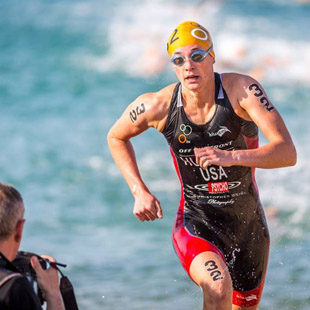
ST: What is the most exhilarating thing about triathlon?
Katie: I love that there are just so many different components to triathlon and so many different places to improve. I thrive on the fact that there will never be a perfect race and that there is always the opportunity to be better.
ST: What did you feel about winning your 20-24 age group at USAT nationals?
I was way more happy about getting 3rd overall than I was with winning my age group. My goal going into the race was to get top three and I was extremely happy with it.
ST: Did you compete for Syracuse at the Collegiate Nationals?
Katie: No, I didn't really start focusing on triathlons until I graduated. I had an agreement with my coach that in season I was a runner and only that – no swimming and biking for me.
ST: Who were the first people from USA Triathlon to contact you and talk about their collegiate recruitment program?
Katie: Barb Lindquist was the very first person to talk to me about the collegiate recruitment program and I was interested from the start. I thought the idea behind the program was really cool and was excited that they would consider me to be involved.
ST: Did you have a tough time deciding to pursue triathlon rather than seeking work or going to grad school?
Katie: I've been pretty lucky with the opportunities that I've been given. After graduating in 2012, I decided I would spend a year focusing on triathlon and seeing how it went while nannying on the side. Only six months later, I was invited to live at the Olympic Training Center in Colorado Springs where I may not be making money but I certainly wasn't losing it. I'd also be given all the resources I could ask for — and training partners! That made my decision pretty easy.
ST: How much have you learned at the Olympic Training Center from your USAT coaches? What has been the hardest thing to learn? What has made the biggest difference?
Katie: I've had the opportunity to work with many USAT coaches between training at the OTC and in Europe: Melissa Mantak, Mike Doane, Greg Mueller, Paulo Sousa, Lindsay Hymen and Jono Hall have all made a big difference. As a result, I'm becoming more of a complete triathlete. The hardest thing for me to learn right now is what works for me. I haven't been doing triathlon for very long and I'm still experimenting with a lot of things.
ST: How do you like your fellow athletes in the USAT Collegiate Recruitment/Elite Development program?
Katie: I like them more than ice cream, and I like ice cream a lot.
ST: Have any elite women offered you advice or mentoring?
Katie: Gwen [Jorgensen] has been really supportive and helpful in guiding me through this first season, especially at the WTS races. She told me to go out there and have fun and to focus on the processes rather than the outcomes. I found the simplicity of her advice really comforting and helpful.
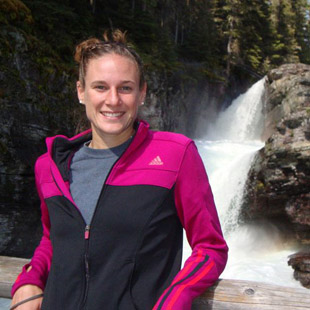
ST: What was the toughest thing to learn about triathlon?
Katie: How to master all of its components and how to balance everything. I am still learning and picking up on that. When I started I could only handle thinking about the swim, bike and run. I couldn't think about the transitions, skills, or even doing core or strength work because I felt like I was on overload doing three sports at once. Now that I am getting the hang of the workload, it's been exciting to start practicing those little things that make a big difference.
ST: What was your first big win?
Katie: Palamós was my first significant win. I didn't expect it and it was awesome seeing all the pieces finally come together.
ST: USA Triathlon High Performance Manager Andy Schmitz explained to me that you were offered a chance very early to compete in Continental Cup, World Cup and WTS races. He said you were fearless and eager to take on the challenges. Is that in your nature?
Katie: I would say in triathlon yes. In anything having to do with heights, no. Coming into draft legal racing this season, I felt I was already out of my comfort zone racing Clermont and Sarasota. When given the opportunity to race San Diego I didn't see any sense in getting comfortable, and wanted to see what I was going to be up against if I wanted to be one of the best. I was scouting.
ST: How did you bounce back from 11th at Edmonton and rise to two World Cup wins?
Katie: I'm a pretty reflective person. In Edmonton I had a slow transition and wasn't as aggressive at the start of the bike so I missed the front pack. I knew I didn't want that to happen again so in both World Cups I didn't make that mistake. Even though I came out a little behind the front swim packs, I gave it everything I could in the run to transition and went hard on the bike to get to the front pack.
ST: What is your biggest task in improving as a triathlete? What is your weakest leg of the triathlon and what are you doing about it?
Katie: My biggest task improving as a triathlete is catching up to those who have a lot more experience than me tactically and skillfully. My coach Melissa Mantak and I have started incorporating a lot more skills and drills into my workouts to help prepare me for any situation. My weakest leg may be the swim right now. I'm working hard to make sure I'm in that front pack all the time rather than right off the back.
ST: What have Bobby McGee and Mike Doane done for your technique in running and swimming?
Katie: Bobby McGee and Mike Doane have both been working wonders for me. Unfortunately they both have their challenges with me: Bobby has to deal with me being rhythmically challenged in the drills and Mike has to deal with my bobble head in the water. They've both put so much time into helping me and I'm coming along. My running feels easier and I'm running faster than ever and my swim can put me in the position to make the front bike pack.
ST: Do you look up to any famous triathletes?
Katie: Sarah Haskins, because she seems like she's such a genuine and nice person. I also really like how dominating she can be in both non-drafting and draft legal races.
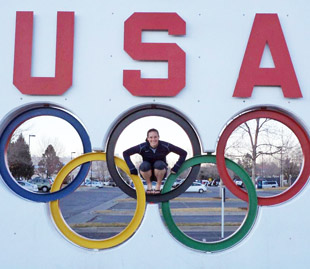
ST: You ran 16:41 for the 5k in your sprint triathlon World Cup win and 35:44 at the 10k in Spain. What times are you aiming at in your future – times that might be necessary to make the Olympic team and possibly medal?
Katie: Those are the times I'm looking for, the "times that might be necessary to make the Olympic team and possibly medal."
ST: Any superstitions? Good luck charms?
Katie: Hawaiian Pizza before every race, sometimes both nights before the race. So far it's working just fine.
ST: Besides training every day in triathlon, what do you do for fun?
Katie: I love the beach, traveling, reading, singing at the top of my lungs in the car (alone or with someone who will participate as well) and dancing like no one is watching — usually hoping no one is.
ST: What do you think of the fact that your illustrious predecessors who raced for the USA — Barb Lindquist, Sarah Haskins and Siri Lindley — spent a lot more time racing before they were able to win their first ITU World Cup races?
Katie: In a way I have yet to completely understand what winning two World Cup races means. I think my circumstances were different in that I was given every opportunity to succeed through the USAT's Collegiate Recruitment Program. That took me from never having ridden in a group last summer to being successful in elite draft legal races this year. By training at the OTC, I continue to be provided with all the resources that I need to succeed. I suspect that Barb, Sarah and Siri didn’t have the same amount of support and guidance early in their careers that I have right now.
ST: Looking at Edmonton, Palamós and Tiszaujvaros, what were the key moments where success or failure hinged on your response to fast-moving conditions?
Katie: In Edmonton I learned real fast how important a fast, aggressive transition was. I learned I shouldn't settle for being in the second group, because there's a big risk that the second pack won’t catch the first pack. I went into Palamós with the goal to fix the mistakes I had made in Edmonton. So I swam as hard as I could and ran as fast I could to transition and it made all the difference. Same thing in Tiszy where I came even closer to missing the front pack off the bike. If I make the front bike pack, I can stay on it and then I'm confident my run will take care of the rest.
ST: What have you learned about recognizing and seizing key opportunities in races in your rookie season?
Katie: First of all, I've learned how fast those moments go by. In Hamburg [a WTS sprint race] I was so focused on trying to catch the front pack that I missed people who came out of the water behind me and were passing me to get on the pack.
ST: One of the USAT staff says you are one of the nicest, most considerate people anywhere. But you also have a killer instinct and are not afraid to attack or to win. Do you agree?
Katie: That was a very nice thing to say. When it comes to racing, I feel I embody a more intense attitude than my demeanor outside racing would show. I tend to be more selfish. I won't let anyone hold me back from what I came to do and I will do anything to achieve my goals.
ST: What do you dream might be your future in triathlon?
Katie: Right now I'm living the dream. I want to keep getting better and continue moving my way through the ranks. I want to be on the Olympic team in the future and if I could get to more than one that would be spectacular. I want to be someone that people know and respect for not only athletic ability but also for being a role model and a good person.


